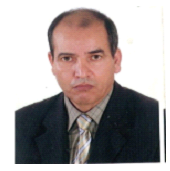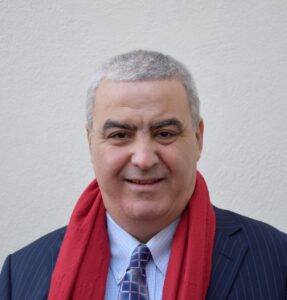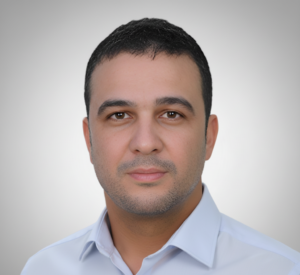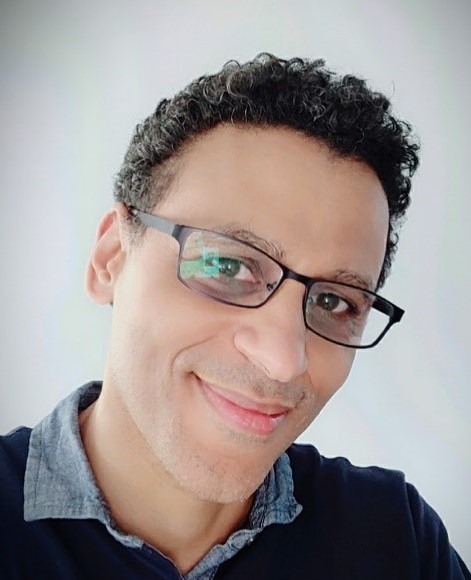KEYNOTE SPEAKERS

<< Pr. Abdallah Chouarfia >>
Bibliographie
Abdallah Chouarfia est Professeur d’informatique à l’Université des Sciences et de la Technologie d’Oran (USTO-MB), Ingénieur en informatique sortant du CERI d’Alger en 1981, Docteur-ingénieur en informatique 1983 de l’Université Paul Sabatier de Toulouse (France). Il enseigne les méthodologies de gestion et de développement de projets informatiques, et la sécurité informatique aux étudiants des premiers, seconds et troisièmes cycles universitaires.
Keynote title : Sécurité informatique et IA : Enjeux, défis, convergence et état des lieux en Algérie
Cette présentation explore l’intersection cruciale entre la sécurité informatique et l’intelligence artificielle dans le contexte cyber sécuritaire actuel. Après une introduction contextuelle, elle définit les concepts fondamentaux de cyber sécurité et de sécurité informatique, puis présente les principes et applications de l’intelligence artificielle. Le cœur de l’analyse porte sur la convergence entre ces deux domaines, montrant d’une part comment l’IA révolutionne les approches de sécurité : automatisation de la détection des menaces, analyse prédictive des cyberattaques, et amélioration des systèmes de protection adaptatifs et d’autre part comment les services de sécurité (confidentialité, intégrité, disponibilité, non répudiation, signature, authentification et droits d’accès) sont applicables à un Système d’IA. Si l’IA est un outil efficace pour renforcer la sécurité, elle est aussi un outil redoutable de cyber criminalité pour automatiser les attaques, créer des deepfakes convaincants et développer des malwares adaptatifs. L’état des lieux examine les réalités actuelles du marché, les solutions émergentes et les défis persistants. Il souligne les opportunités offertes par l’IA pour renforcer la cyber sécurité, tout en identifiant les nouveaux risques qu’elle génère : attaques adversariales, utilisation malveillante par les cybercriminels, et vulnérabilités spécifiques aux systèmes d’IA. L’état des lieux s’arrête aussi sur la situation du pays avec l’approche stratégique ambitieuse avec l’adoption du plan national IA et un dispositif national de cyber sécurité, visant une contribution de 7% au PIB d’ici 2027. La présentation conclut sur les perspectives d’avenir et les recommandations stratégiques pour naviguer efficacement dans ce paysage technologique en évolution rapide, où l’IA devient simultanément un bouclier et une épée dans la guerre cybernétique moderne.

<< Pr. Abdelhamid Mellouk >>
Bibliographie
Abdelhamid Mellouk (Full-time Professor at University of Paris-Est Creteil (UPEC)), ClEx2 (via National Commission), Networks & Telecommunications (N&T) Department, IT-Health High School Engineering Department and TincNET research team (http://tincnet.fr/), France. He graduated in computer network engineering from the Computer Science High Eng. School, University Oran1 (ex. Senia), Algeria, in DEA computer science from jointly the University of Paris Sud XI Orsay (Université Paris Saclay), received his Ph.D. in informatics from the same establishment, and a Doctorate of Sciences (Habilitation) diploma from UPE. He is an active member of the IEEE Communications Society and held several offices including leadership positions in IEEE Communications Society Technical Committees. He has published/coordinated seventeen books in IT areas and more than 250 several refereed international publications in journals, conferences, books, in addition to numerous keynotes and plenary talks in flagship venues. He serves on the Editorial Boards or as Associate Editor for several journals (including IEEE CST and IEEE TVT), and he is chairing or has chaired (or co-chaired) some of the top international conferences and symposia (including IEEE ICC and IEEE GlobeCom). He is also the founder of Network Control Research and Curricula activities at UPEC and President of several other scientific institutions, including the Policies and Programs commission at the Algerian National Council for Scientific Research and Technologies, FR Haut Conseil de l’Evaluation de la Recherche et de l’Enseignement Supérieur (HCERES) Expert, FR National University Council (CNU) member and co-President of Data Science-ArtificiaI Intelligence Systematic Deep Tech Cluster. Expert invited to the last GFAI (Global Forum of Artificial Intelligence for Humanity), held in Paris in 2019 under the high authority of the president of the republic, bringing together 200 international experts in the field of artificial intelligence, following the recommendations of the last G7, Abdelhamid Mellouk was also one of the co-writers in 2019 of the Artificial Intelligence-Algeria plan, under the umbrella of Algerian DGRSDT and MESRS, which led, among other things, to the creation of 2 national schools in this field in Sidi Abdallah in Algeria. His research work has been pioneering in the field of neural networks and artificial intelligence where his doctoral thesis, presented in 1994, had put forward the so-called neuronal techniques designed for automated systems, the invention of a continuous automatic speech recognition system, based on predictive Time Delay Neural Networks (TDNN), considered among the first systems designed in the implementation of predictive neural networks for speech recognition. He has received several scientific distinctions including the «Distinguished Technical Achievement Award», obtained in 2020 by the IEEE Communication Society due to his scientific work and he is the Director of a new book collection series edited jointly by ISTE and Wiley. He has directed and supported over 25 doctoral thesis that have resulted in more than 250 scientific publications.
Keynote title : L’Intelligence des savoirs face à l’intelligence de l’imagination : outils et perspectives.
L’intelligence artificielle (IA) n’est plus une promesse lointaine : elle est aujourd’hui au cœur des mutations technologiques, économiques et sociétales. Des modèles de langage génératifs aux systèmes de vision embarquée, des algorithmes de diagnostic médical aux assistants autonomes, les avancées récentes ont marqué un véritable tournant dans notre rapport à la machine, à la connaissance et à la décision. Quelles ruptures technologiques se profilent ? Comment concilier innovation et souveraineté ? Quelle place pour l’humain dans un monde cohabitant avec des systèmes autonomes ? Ces questions seront abordées dans la conférence avec un focus autour des dernières évolutions dans ce domaine en se focalisant sur les axes de recherche à investiguer comme les LLM, l’approche AgentIX ou encore l’explicabilité, en passant par les algorithmes. Des cas d’usage seront traités pour montrer l’efficience de ces approches.

<< Dr. Mohammed El Amin Larabi >>
Bibliographie
Dr. Mohammed El Amin Larabi is a computer scientist and researcher at the Algerian Space Agency specializing in artificial intelligence, computer vision, and advanced geospatial data analytics. His pioneering work applies deep learning to enhance Earth observation and GeoAI applications, advancing responsible and impactful AI solutions for environmental and societal challenges. Driven by innovation, Dr. Larabi’s research bridges AI and geoscience to promote sustainable development through data-driven insights and interdisciplinary collaboration.
Keynote title : Artificial Intelligence in Earth Observation
This talk highlights the transformative power of Artificial Intelligence in Earth Observation to advance the Sustainable Development Goals (SDGs). It explores how AI-driven geospatial analytics can enhance our understanding of environmental and societal dynamics, enabling more accurate monitoring and informed decision-making. By harnessing machine learning, computer vision, and data fusion, AI transforms vast Earth observation data into actionable insights. The talk emphasizes how these intelligent systems can drive innovation in climate resilience, sustainable urban development, and resource management—positioning AI as a cornerstone technology for achieving global sustainability and shaping a more resilient future for our planet.

<< Dr. Dr. Ahmed MEHAOUA >>
Bibliographie
Ahmed MEHAOUA is a full Professor of Computer science at the School of Mathematics and Computer Science at the University of Paris City, France since 2006. Since May 2025, he is an invited professor at the South China University of Science and Technology China, and an associate professor of the Dongguan University of Technology, China. From 2012 to 2015, he was a visiting professor at the Division of IT convergence Engineering, POSTECH University, South Korea, where he is conducting research on Wireless Healthcare Systems and Smart Homes Applications. He is also a Lead Researcher of the AI for Cybersecurity and Data Science Group at Borelli Research Center, Paris, France, a governmental funded research center in Paris, France. He was the Vice dean of the Scientific Council and the Director of the graduate studies on Computer Science of the School of Mathematics and Computer Science and the school of Fundamental and Biomedical Sciences, Université Paris Cité. Prior to join Université Paris Cité, he was an assistant and associate professor at the University of Paris-Saclay, France where he founded and led the Multimedia and Wireless Networking Laboratory. From 1998 to 2011, he was with the University of Cambridge, UK, as an assistant research fellow in the Center for Communications Systems Research (CCSR), a University of Cambridge and Hitachi Telecom Europe joint R&D center. From 1995 to 1998, he was with the Computer Science Research Institute of Montreal, Canada, a research center associated to McGill University and University of Montreal, Canada, where he was involved in various R&D projects on telecommunication System Management, and Quality of Service Management in broadband networks with Ericsson & Bell Canada. His research interests include Artificial Intelligence for security and resource management in Wireless Medical Sensor Networks, Wireless Area Body Networking (WBAN) for medical and healthcare applications, and Quality of Service (QoS) optimization for multimedia communications. His research has been supported by government and industry funded projects such as the European Commission, French Ministry of Higher education and research (ANR), National research agencies such as CNRS and INSERM, South Korea and China Research Councils and major European firms such as THALES, Thomson, Siemens, Ericsson and Orange, among others. He published more than 200 papers on refereed journals and conferences and he served on various program committees of conferences in computers and communications (Globecom, ICC, HealthCom, PIMRC, LCN, VTC, WCNC, …).
Contact address: Université Paris Cité Faculty of Sciences School of Mathematics and Computer Science 45 rue des saints-peres 75006 Paris, France ahmed.mehaoua@u-paris.fr
Keynote title : Remote Healthcare Monitoring based on Wireless Body Area Network and Deep/Machine Learning: A Cybersecurity perspective
Nowadays, interests in real-time and remote Healthcare Monitoring System (HMS) based on Wireless Body Area Network (WBAN) and Artificial Intelligence have grown considerably due to the increasing aging population. HMS expected to reduce healthcare expenses by enabling the continuous monitoring of patient health remotely during their daily activities. From a medical point of view, WBAN, a sub-system of the Internet of Medical things (IoMT) is emerging as a key technology in providing mobile and real-time health monitoring and diagnoses of many life-threatening diseases (Heart attack, Stroke, Epilepsy, Diabet, …). Accordingly, several studies have been done in this area and already various journal and conference papers focusing either on IoMT, WBAN or on cloud-based healthcare services. Nevertheless, there is no extensive coverage on the HMS based on WBAN and AI. This talk will focus on the WBAN and AI in terms of emerging smart wireless technologies (supporting infrastructure and technology), HMS architecture and its applications (Continuous Monitoring and Assisted Living) and some challenge design issues related to information and system security and anomaly detection.
